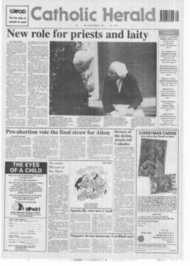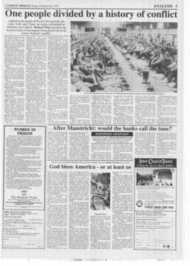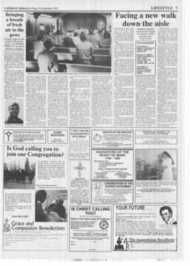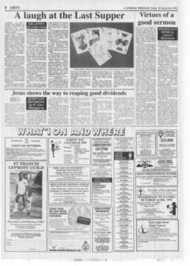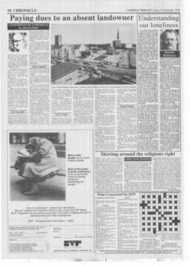Page 7, 18th September 1992
Page 7
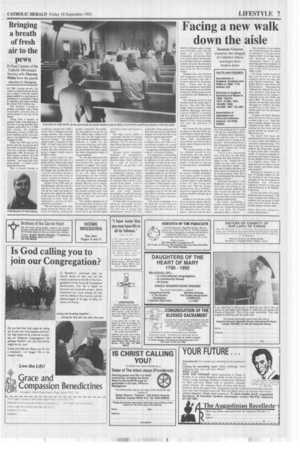
Report an error
Noticed an error on this page?If you've noticed an error in this article please click here to report it.
Tags
Share
Related articles
Missionaries Use The Gospel As The Measure Of Leaven To...
Business Plan For The Parish
Diocesan Missions Pioneer
Mission Initiative Brings New Life To City
Not Strangers But Partners!
Bringing a breath of fresh air to the pews
Fr Paul Cannon of the Catholic Missionary Society tells Murray White how the parish mission is changing
IN THE coming decade, the visitor to a church mission will be just as likely to find the mission priest huddled in a small group of parishioners in somebody's house as standing in the pulpit extolling the virtues of the Catholic way.
The "mission" is being redefined, as parishes seek a more meaningful, personal way to attract people to the life of the church.
Along with a number of religious orders long-dedicated to the task of giving parishes their spiritual equivalent of a 12,000 mile service, the Catholic Missionary Society (CMS) has been leading parish missions since it was founded by Cardinal Vaughan in 1902.
Today the CMS team of five priests and one lay person lend their skills to around 30 parishes a year and is already booked up until early 1994. Its director, Fr Paul Cannon, believes the full diary reflects the desire of many churches and especially their parish priests to infuse a new spark into their lives.
This is despite having to
continually explain that CMS's raison d'etre is nothing to do with foreign missions. This weekend. as collections are made for "Home Mission Sunday" the major annual source of income for the CMS Fr Paul's first wish is that people do not automatically assume that their donations are going to support Church work in Zambia or India.
His second might be that people approach the idea of a parish mission with an open mind of expectations. Sometimes the simplest testimony can highlight the changes that can take place in a parish community during a mission far more than scores of stories of pastoral councils or training initiatives being set up.
Another of the CMS team, Fr Paul Billington, tells the story of a mission in an inner city parish: "On the last night, the people of the parish were gathered to reflect on the success of the mission and beginning to draw from the experience a picture of their parish five years hence.
"The two mission priests were going around the church with a radio microphone, picking up people's comments. Eventually, the microphone was given to a frail, elderly lady, sitting in the front row, for her suggestions. Even with the microphone, it was difficult to make out her nervously faltering and softly spoken words. Nevertheless, when she had finished her brief counsel the whole congregation began to clap and applaud.
"No one had really heard her comment. It was not her words that merited this spontaneous outburst of support. The people were clapping someone among them who was special. She hadn't in her life done anything extraordinary by the world's standards. But she was one of the very many unknown, unparaded people who try to live simple, holy lives for God's sake. The people knew, instinctively, that this humble woman spoke with Gospel authority. Her voice rang true. No one else received a similar ovation.
"The incident reminded me of the passage from Scripture with Jesus encouragingly tells his disciples not to worry what they have to do or say, the Holy Spirit will direct them and speak to them."
But what exactly makes a "successful" mission? Fr Cannon pauses before suggesting only half jokingly: "If it is not over and done with by the time we have left and reached the first motorway junction".
Besides those intangible moments of spontaneous applause, there are a number of practical steps, which, although not a sign of success in themselves, can provide solid foundation.
The buzzword of the moment is collaborative ministry, which means in CMS parlance, setting up a small team nine months prior to a mission. They will be a cross section of the parish a sort of modern-day twelve disciples priests, old and young lay people who will work together increasingly in small house groups to decide the priorities for the parish during its mission.
Fr Paul talks of parishioners taking an "ownership" in what goes on in their parish. This is a very 90s way of saying that parishioners should be both
responsible about taking part in their local church and proud about doing so. He would also like to see more lay training opportunities.
In this Decade of Evangelisation, the CMS is an interesting example of a group that has been doing precisely that evangelising and helping others to do so for most of its history.
No prediction is forthcoming from the CMS on how its role will be different, if at all, at the end of the Decade. Fr Paul and his team, although acknowledging new opportunities for the mission of the Church through the rapidly expanding media, do not feel that television will ever take priority. Allied to the CMS is the Catholic Enquiry Centre, which last year had around 14,000 enquiries from lapsed or non-Catholics after advertisements were placed in newspapers such as The Sun and Daily Mirror. But the main thrust will always be parish missions, believes Fr Paul.
"The parish is important. It is the local unit, it will always be what people can best relate to, more so than their diocese or country."
blog comments powered by Disqus


